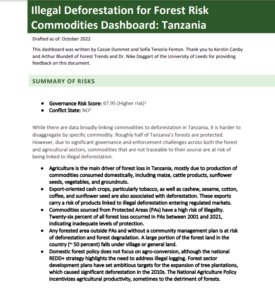Illegal Deforestation for Forest-risk Commodities Dashboard: Tanzania
By Cassie Dummett and Sofia Tenorio Fenton View PublicationAgriculture is the main driver of forest loss in Tanzania, mostly due to production of commodities consumed domestically, including maize, cattle products, sunflower seeds, vegetables, and groundnuts. Export-oriented cash crops, particularly tobacco, as well as cashew, sesame, cotton, coffee, and sunflower seed are also associated with deforestation. These exports carry a risk of products linked to illegal deforestation entering regulated markets.
Commodities sourced from Protected Areas (PAs) have a high risk of illegality. Twenty-six percent of all forest loss occurred in PAs between 2001 and 2021, indicating inadequate levels of protection. Any forested area outside PAs and without a community management plan is at risk of deforestation and forest degradation. A large portion of the forest land in the country (~ 50 percent) falls under village or general land.
Domestic forest policy does not focus on agro-conversion, although the national REDD+ strategy highlights the need to address illegal logging. Forest sector development plans have set ambitious targets for the expansion of tree plantations, which caused significant deforestation in the 2010s. The National Agriculture Policy incentivizes agricultural productivity, sometimes to the detriment of forests.

